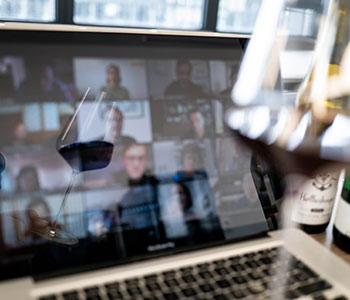
Study on online wine tastings
Gergely Szolnoki from the University of Geisenheim has dedicated a study to online tastings. In a cooperation with the Institute of Masters of Wine and Winetourism.com in Sweden, he conducted a broad cross-national study. 1,423 vintners in over 40 countries were surveyed.
December 2021
Szolnoki, Gergely / Luecke, Nikolaus Moritz / et al. (2021). A cross-cultural analysis of the motivational factors and profitability of online wine tasting during the Covid 19 pandemic. British Food Journal. Vol. 123 No. 13, pp. 599-617.
The full paper can be read in the download here.
Online Wine Tastings (OWT) have come to stay. We are not the only ones who have had good experiences with virtual tastings and press & trade events; winegrowers, in general, are pleased with good reception, good financial results, and other benefits. These are the findings of a study conducted at the Geisenheim University of Applied Sciences in cooperation with the Institute of Masters of Wine and the Swedish Winetourism.com. The goals are to establish contact with existing customers and attract new ones, to provide an experience, and to promote sales.
When the world blew up in our faces a year and a half ago, we were at a standstill. Trade fairs, small and large tasting opportunities, winery visits, and visits to importers were - and still are - canceled. And as always, when old systems are no longer good, the world gets creative. So does the wine world. One solution is online wine tastings and presentations. Be it that winemakers taste with private wine lovers, restaurants, and other trade professionals trying to make up for lost sales with their customers. Or be it that entire press events are held online or, as we do, that specialist tastings are offered for wineries. A perfect medium to gather interested people around the virtual table all over the world. The international response to Fred Loimer's presentation of sparkling wine was enormous. The cost factor was inconspicuous in comparison, the effort for the guests was negligible.In addition to the cancellation of events and trips to the importers, the winegrowers also lost their profitable ex-cellar sales. It is simply not possible to visit wineries during the lockdown. Szolnoki cites figures from Germany, for example, according to which 12% of all wine sales happen ex-cellar and, with a turnover of 1.44 billion euros, have a value share of 22%. This is not anything. And this fell away completely once the pandemic began. The majority of wineries therefore also relied on their webshops and upgraded them. For many, this was their entry into the online business. In the meantime, many have also introduced virtual tastings for private individuals and professionals. According to the study, this has also been economically successful, here is a look at the figures for Germany and Austria, more in the paper.
| unprofitable | neutral | profitable | |
| Average | 6 % |
38 % |
56 % |
| Germany |
5 % |
24 % |
71 % |
| Austria |
6 % |
72 % |
22 % |
When asked about the purpose of the OWT, these were mentioned as the most important goals:
| Marketing value & brand awareness |
Replace canceled events/winery visits |
Acquire new customers |
Strengthen customer loyalty |
Increase direct sales |
|
| Average |
67 % | 65 % | 64 % | 62 % |
56 % |
| Germany |
59 % | 76 % | 78 % | 70 % |
64 % |
| Austria |
72 % | 72 % | 44 % | 72 % |
39 % |
It is also interesting to note that the target audience of these tastings - mainly via Zoom and other platforms such as youtube or Facebook - is very different in the countries studied.
| B2C | B2B | B2C & B2B |
|
| Average | 51 % |
20 % |
29 % |
| Germany |
82 % |
5 % |
14 % |
| Austria |
22 % |
28 % |
50 % |
Many other figures, data, and facts, for example on OTW platforms or the duration of OTW, can be found in the study. They are interesting for all those who are active in the wine industry and want to make up for lost sales with OTW or develop new customer groups. Thus, Covid-19 can be seen as a bit of creative destruction of the wine world. We would say that this creativity should be used!




